 |

By Mary Beth Hatem, NIDA NOTES Managing Editor
More than 800 drug abuse researchers and clinicians gathered in New York for the second NIDA conference on Blending Clinical Practice and Research with a common goal: Learn from one another and enhance drug abuse treatment now and in the future. Plenary sessions and indepth workshops featured leading experts presenting up-to-the-minute research updates and clinical insights and perspectives from both professional communities on the nuts and bolts of incorporating both research and practice perspectives into their own research studies and clinical practice.
In opening remarks, NIDA Acting Director Dr. Glen Hanson focused the attention of the group on the most compelling rationale for blending research and practice: "Even as science helps us to understand addiction and treat it more effectively, lives continue to be lost. The question must always be asked, 'Can we do better?' The answer most certainly is yes. We know we can do better and that we can help each other do better."
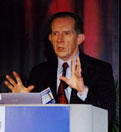 |
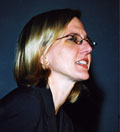 |
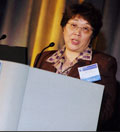 |
| (left to right) NIDA Acting Director Dr. Glen R. Hanson opened the Blending Conference; Dr. Kathleen Carroll of Yale University described a successfully "blended" project in Connecticut; and Dr. Betty Tai, director of NIDA's Center for the Clinical Trials Network, reported on CTN progress. |
NIDA's commitment to blending research and practice is crucial to its mission of reducing the suffering and devastation caused by drug abuse and addiction. "Research investigators depend on clinicians," Dr. Hanson noted. "To gain benefit from science, we must get it out into practice."
Through the National Drug Abuse Treatment Clinical Trials Network (CTN), NIDA's commitment to blending research and practice continues every day of the year. CTN was established out of the same "blending" impulse: the need to create partnerships with providers so that, working together, science and practice might each achieve better and faster results. Dr. Betty Tai, NIDA's director of the Center for CTN, provided a progress report on the network.
A variety of researchers and treatment providers shared perspectives on building bridges between research and practice. The personal and organizational dynamics of blending were addressed by Dr. Richard Rosenthal of St. Luke's-Roosevelt Hospital Center in New York, who challenged attendees to consider their own personal inclination. "To what extent," Dr. Rosenthal asked, "are we open to the idea that we are part of the problem? How open are we to the idea that we don't have all the answers?"
Clinical investigator Dr. Kathleen Carroll, principal investigator of CTN's New England Node, discussed the rewards of blending and offered specific advice to researchers and clinicians. NIDA's new journal, Science & Practice Perspectives, features a roundtable discussion with members of Dr. Carroll's study team.
"Applying research to community settings is not simple," said Dr. Herbert D. Kleber of the New York State Psychiatric Institute, Columbia Unversity, noting that skills and knowledge are required as well as understanding and commitment. "Research can suggest that certain interventions may be useful in
treating substance abuse. The overall challenge remains to figure out which interventions will be most useful for which patients in a particular community setting," he said.
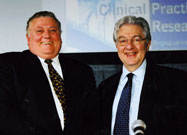 |
 |
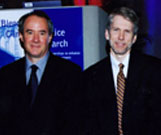 |
| Other participants and presenters included (left to right) Paul Puccio, New York State Office of Alcoholism and Substance Abuse Services; Dr. Herbert D. Kleber, New York State Psychiatric Institute and Columbia University; Dr. Lawrence S. Brown, Jr., Addiction Research and Treatment Corporation; Dr. John Rotrosen, New York University School of Medicine and CTN New York Node; Dr. Edward V. Nunes, Columbia University and CTN Long Island Node. |
The conference's New York location was a special topic of discussion. Dr. David Vlahov, of the New York Academy of Medicine, presented preliminary data on the impact of the September 11 attacks on substance use in Manhattan.
Dr. Vlahov reported that, in response to a telephone survey, residents reported substantial increases in cigarette, alcohol, and marijuana use from before the World Trade Center attack to 5 to 8 weeks after the event.
The conference's 24 workshops reflected the blending theme, with topics addressing major research advances and the most urgent concerns for treatment providers: adolescent substance abuse, school-based interventions, and alternatives to incarceration, to name a few. Each workshop included presentations by research investigators and treatment providers. For each topic, three critical dimensions were addressed: what current research tells us, considerations for putting research to use, and considerations for future research.
Looking to the future of drug abuse research and treatment, Dr. Mitchell Rosenthal, executive director of Phoenix House, closed the conference by addressing the complicated relationship between research and practice. "Research is hugely important to treatment providers and will always be so," he noted. "Its importance extends beyond treatment advances to changes in how treatment is provided and funded, in what the expectations for treatment are. An important responsibility for drug abuse treatment leaders is to speak to the day-to-day realities of the clinic."
Volume 17, Number 3 (October 2002)
|
 |
|